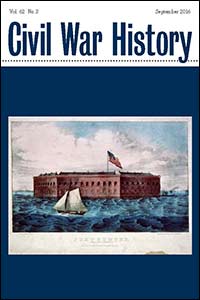September 2016, Volume 62, No. 3
May 20th, 2016Did the Tug Have to Come? A Critique of the New Revisionism of the Secession Winter
by: James L. Huston
Several historians have made the case that the actions of Abraham Lincoln and antislavery Republicans brought on the Civil War because of a refusal to compromise on the issue of slavery’s expansion. This interpretation has questionable foundations. The new revisionists do not consider the problems surrounding the act of separate state secession; southerners had a multitude of warnings that northerners did not accept secession without the consent of the other states. The revisionists claim that a compromise in 1860-1861 could have avoided the loss of four border slave states to the Cotton Confederacy, but fail to acknowledge that the same conditions that produced secession then could have produced secession later. The new revisionists also maintain that Jefferson Davis and his cabinet had no recourse but to fire on Fort Sumter when Lincoln attempted reprovisioning; they omit the other options that the Confederate leaders did not even consider. Finally, the new revisionists have an over-reliance on contingency and fail to weigh the forces bringing about separation and war.
Public Necessity or Military Convenience? Reevaluating Lincoln’s Suspensions of the Writ of Habeas Corpus during the Civil War
by: Robert O. Faith
Few historians have explored subsequent habeas cases during the crucial period leading up to the Habeas Corpus Act of 1863, in which Congress finally sanctioned Lincoln’s earlier suspensions of habeas corpus nearly two years after his initial suspension, of April 27, 1861. This article uses other high-profile cases to reveal a pattern in which military arrests under Lincoln occurred as a matter of routine military convenience rather than public necessity. All of these cases involved the interference of at least one member of the Lincoln administration in areas often far removed form the battlefield, prompting observers in both the United States and England, as well as modern historians, to question the necessity of certain military arrests and consider the practical consequences of executive suspension on civil liberties during the nation’s greatest trial.
A Civil War Hermaphrodite
by: Jonathan W. White
This primary source exploration pertains to the life of Ellen/Edgar Burnham, a striking northern woman who transitioned to a male identity in the midst of the Civil War. Through an examination of a letter in the records of the Adjutant General’s Office, combined with a deeper research into various newspapers, White sheds light on a story widely reported in the newspapers but absent in the larger scope of the cultural history of the Civil War.
Robert O. Faith is a PhD student at the University of Akron. He holds degrees in history and education from The Pennsylvania State University and Indiana University of Pennsylvania.
James L. Huston is professor of History at Oklahoma State University. He has published several books and articles on the Civil War, including The Panic of 1857 and the Coming of the Civil War, and, most recently, The British Gentry, the Southern Planter, and the Northern Family Farmer: Agriculture and Sectional Antagonism in North America.
Jonathan W. White is associate professor of American Studies and a senior fellow at the Center for American Studies at Christopher Newport University. He is the author and editor of several books, including Emancipation, the Union Army, and the Reelection of Abraham Lincoln (2014).
Book Reviews:
McPherson, James. The War That Forged a Nation: Why the Civil War Still Matters. Reviewed by J. Matthew Gallman.
O’Connell, Robert L. Fierce Patriot: The Tangled Lives of William Tecumseh Sherman. Reviewed by Anne Sarah Rubin
Frank, Lisa Tendrich. The Civilian War: Confederate Women and Union Soldiers during Sherman’s March. Reviewed by Elizabeth Parish Smith.
Jamieson, Perry D. Spring 1865: The Closing Campaigns of the Civil War. Reviewed by Mandy Tompkins.
Lewis, Patrick A. For Slavery and Union: Benjamin Buckner and Kentucky Loyalties in the Civil War. Reviewed by Thomas C. Mackey.
Quinn, Edythe Ann. Freedom Journey: Black Civil War Soldiers and the Hills Community, Westchester County, New York. Reviewed by Eric Michael Washington.
Jordan, Brian Matthew. Marching Home: Union Veterans and Their Unending Civil War. Reviewed by Paul A. Cimbala.
Drake, Brian Allen, ed. The Blue, the Gray, and the Green: Toward an Environmental History of the Civil War. Reviewed by Erin Stewart Mauldin.
Brown, Thomas J. Civil War Cannon: Sites of Confederate Memory in South Carolina. Reviewed by Blain Roberts.
Pelletier, Kevin. Apocalyptic Sentimentalism: Love and Fear in Antebellum Literature. Reviewed by Evan A. Kutzler.
Summers, Mark Wahlgren. The Ordeal of the Reunion: A New History of Reconstruction. Reviewed by Margaret M. Storey.
Holzer, Harold, Craig L. Symonds, and Frank J. Williams, eds. Exploring Lincoln: Great Historians Reappraise Our Greatest President; Kateb, George. Lincoln’s Political Thought. Reviewed by Edward R. Crowther.


